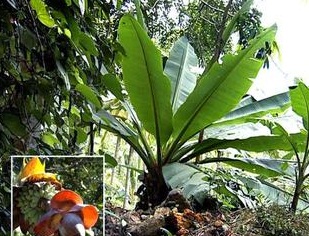6 February 2013
Wild banana species struggling for survival
Unregulated exploitation for trade is threatening the survival of the Cliff Banana ( Ensete superbum ), a rare medicinal and ornamental plant endemic to the Western Ghats, Assam, and Rajasthan.
Researchers at the School of Ecological Informatics, Indian Institute of Information Technology and Management (IIITMK), Thiruvananthapuram, and the School of Biotechnology and Health Sciences, Karunya University, Coimbatore raised the alarm about the imminent extinction of the species. They called for drastic measures to regulate the collection of the endangered species from the wild.
“Unchecked collection of seeds and seedlings has driven the species to the verge of extinction. It is estimated that there are hardly 2,000 plants left in the wild,” said V. Saroj Kumar, research associate, IIITMK, who has published two papers on the species in the Current Science journal of research.

Commercial
The annual demand of the species in the ornamental plant trade is estimated at more than 50,000 seedlings, all of them collected exclusively from the wild by tribal communities such as Kani, Kurichiyar, Kurumba, Irula, and Paniyar. The seeds, leaves, and inflorescence are also put up for sale in markets and nurseries. The seeds command a market price of Rs.200 to Rs.450 a kg. Known for their medicinal value, the seeds are widely used by traditional healers to treat diabetes, leucorrhoea, and kidney stone. Unlike other banana species, E.superbum does not produce suckers; seeds are the only means of natural multiplication.
“Our studies show that indiscriminate harvesting of unripe fruits for seeds has interfered with the natural plant propagation and led to a decline in the native population of E.superbum over the last decade,” Mr. Kumar said. Frequent destruction of fruits by elephants and monkeys posed another threat to the species, he said.
Conservation challenge
Locally known as Kalluvazha, E. superbum mostly grows on rocky cliffs and outcrops. However, seedlings nurtured in gardens fail to produce viable seeds despite healthy inflorescence. “This inability limits the prospects of conserving the species outside its natural habitat,” said Mr. Kumar, who is planning to launch a website to campaign for the conservation of E.superbum . “Imposing a total ban on the collection of fruits and seedlings from the natural habitat is the only way to conserve this plant. Mass cultivation in the natural habitat and development of agro techniques for propagation have to be simultaneously pursued,” he said.
Chairman of Kerala State Biodiversity Board Oommen V. Oommen said the board would do whatever was possible to conserve the species. “We will join hands with other agencies to develop scientific techniques for propagation. E.superbum could be a candidate species for the eco restoration of spent quarries,” he told The Hindu .
